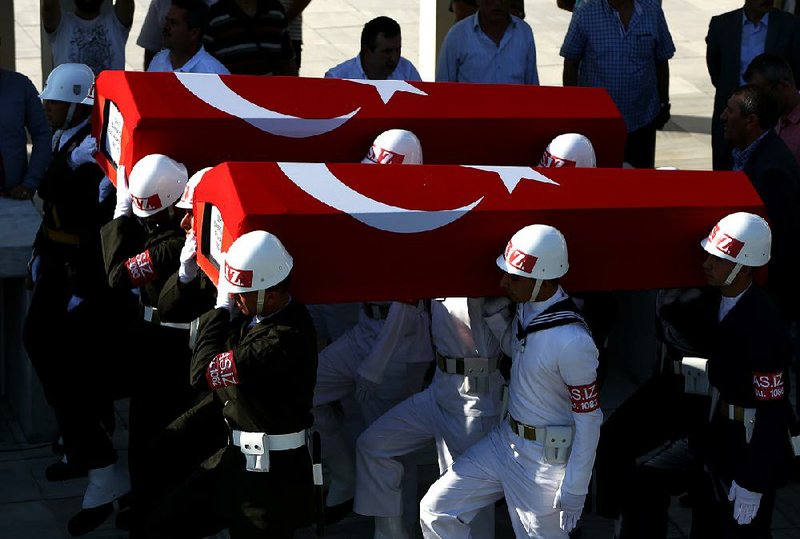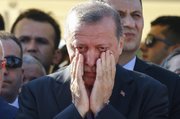ISTANBUL -- The Turkish government moved Sunday to shore up the power of President Recep Tayyip Erdogan and remove those perceived as enemies after a failed coup, saying it has detained 6,000 people, including members of the judiciary.
On Sunday, Prime Minister Binali Yildirim said life had returned to normal after at least 294 people were killed and more than 1,400 were wounded.
"Another calamity has been thwarted," Yildirim said in Ankara after visiting Turkish Radio and Television, the state-run public broadcaster that had been seized by soldiers supporting the coup. "However, our duty is not over. We shall rapidly conduct the cleansing operation so that they cannot again show the audacity of coming against the will of the people."
Yildirim said those involved with the failed coup "will receive every punishment they deserve." Erdogan suggested that Turkey might reinstate capital punishment, which was legally abolished in 2004 as part of the country's bid to join the European Union.
Speaking to a crowd of supporters in front of his Istanbul residence Sunday evening, Erdogan responded to frequent calls of "We want the death penalty!" by saying: "We hear your request. In a democracy, whatever the people want, they will get."
Grief-stricken relatives in Ankara and Istanbul buried those killed in the coup attempt, and prayers for the dead were read simultaneously at noon Sunday at Turkey's 85,000 mosques. Erdogan attended a funeral for his campaign manager Erol Olcak and his 16-year-old son, Abdullah Tayyip Olcak. The president wept and vowed to take the country forward in "unity and solidarity."
Turkey's state-run news agency said 1,800 special forces police officers have arrived in Istanbul from neighboring provinces and were patrolling the city. The report said Erdogan has ordered F-16 fighter jets to patrol Turkish airspace nationwide, and Istanbul Police Chief Mustafa Caliskan has ordered the shooting down of any helicopters flying overhead without warning.
Friday night's uprising by a faction of the military appeared to take the government -- and much of the world -- by surprise. It ended hours later when loyal government forces regained control of the military, and civilians took to the streets in support of Erdogan.
"The factions within the military opposed to Erdogan who did this just gave him carte blanche to crack down not only on the military but on the judiciary," said Aykan Erdemir, a former lawmaker from the main opposition party and now a senior fellow at the U.S.-based Foundation for Defense of Democracies. "The coup plotters couldn't have helped Erdogan more."
The rapid suppression of the putsch was greeted by Turks across the political spectrum. Turkey's four main political parties released a joint declaration during a parliamentary meeting Saturday denouncing the coup attempt.
"No matter their political views, all parties came together arm-in-arm against the coup," Yildirim said. "They cried out together."
In a half-dozen cities, tens of thousands marched throughout the day after officials urged them to defend democracy and to back Erdogan, Turkey's top politician for 13 years.
At nightfall, flag-waving crowds rallied in Istanbul's Taksim Square, Ankara's Kizilay Square and elsewhere.
The Yeni Safak newspaper used the headline "Traitors of the country," while the Hurriyet newspaper declared "Democracy's victory."
"Just a small group from Turkish armed forces stood up against our government ... but we, the Turkish nation, stand together and repulse it back," said Gozde Kurt, a 16-year-old student at a morning rally in Istanbul.
Senior Turkish officials said the coup conspirators were loyal to Fethullah Gulen, a Turkish cleric living in Pennsylvania, and demanded that the U.S. extradite him. Erdogan has often accused Gulen of trying to overthrow the government, saying at a funeral in Istanbul that he would "clean all state institutions of the virus" of Gulen's supporters.
Secretary of State John Kerry said the U.S. was open to the idea of extraditing Gulen, but said Turkey must first provide evidence that meets U.S. legal standards.
"They also have to make a formal request for extradition through the judicial process. They haven't done that yet," he said in an interview airing Sunday on NBC's Meet the Press. "And that has to be accompanied by evidence and by demonstrated facts, which would lead a court to approve the extradition itself. We're not blocking it; we've never had a formal request."
Gulen espouses a philosophy that blends a mystical form of Islam with democracy. He is a former Erdogan ally who has been put on trial in absentia in Turkey, where the government has labeled his movement a terrorist organization.
At two weekend news conferences, Gulen strongly denied any links to terrorism or any role in or knowledge of the coup.
"As someone who suffered under multiple military coups during the past five decades, it is especially insulting to be accused of having any link to such an attempt," he said.
Despite the tensions with the U.S., Turkey will continue to allow missions by U.S. warplanes flown from the Incirlik air base against Islamic State targets, Defense Department officials announced Sunday.
Turkish authorities had closed their airspace after the failed coup, halting U.S. missions against the Islamic State flying from Incirlik. The Air Force has said that Incirlik handled roughly one-third of all U.S. refueling operations for the air war over Iraq and Syria.
Kerry said Sunday on ABC's This Week that Turkey attributed the closing of Incirlik to the discovery that some aircraft used in the attempted coup had refueled there.
Kerry said the failed coup will not diminish Turkey's role in the fight against the Islamic State.
"According to our commanders, there may have been a minor delay here or there or something, but it has not affected the fundamental direction or commitment to the fight," Kerry said on CNN's State of the Union.
The suspects in the failed coup are being charged with "membership in an armed terrorist organization" and "attempting to overthrow the government of the Turkish Republic using force and violence or attempting to completely or partially hinder its function." The agency said 58 homes of prosecutors and judges have been searched.
Officials also said 2,745 judges and prosecutors have been dismissed.
Another 149 police officers were detained in Ankara, according to Turkey's state-run news agency, citing the office of the city's governor.
Information for this article was contributed by Sarah El Deeb, Suzan Fraser, Dominique Soguel, Emrah Gurel, Bram Janssen, Cinar Kiper, Mucahit Ceylan, Desmond Butler and Michael Rubinkam of The Associated Press; by Carol Morello of The Washington Post; and by staff writers of The New York Times.
A Section on 07/18/2016

